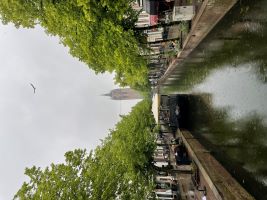Diaspora, Democracy, and Delft
After two weeks in Den Haag, I am starting to settle in and feel more at home. Monday was a holiday, so the workweek was shorter. Nevertheless, I still got a lot done!
At the beginning of the week, I wrapped up my work from last week, analyzing the impact of diaspora representation on the politics of various countries. I was intrigued by the patterns which emerged: generally, diaspora voters are less likely than their compatriots back home to vote in elections, and they often exhibit very different political preferences. In Croatia, for instance, the diaspora is overwhelmingly conservative, and their seats in the parliament are safe seats for the dominant right-wing party. In Senegal, diaspora voters are perceived as carrying outsize political influence by virtue of their family’s dependence on remittances, although this perception seems mistaken.
After finishing my work on diaspora representation, I moved on to another, broader project: constitutional developments in the Western Balkans. International IDEA is looking to expand its network of constitutionalists to this region, given the important constitutional issues surrounding the possible EU accession of Western Balkan nations and their unique ethnic politics. Eventually, I’ll compile a report on the constitutional challenges facing different Western Balkan countries, but right now I am still in the research phase. I’ve started with Albania, and it has been fascinating learning about the country’s political history since the fall of the Communist regime in 1991. I am particularly struck by the similarities between Albanian politics and American politics – specifically the deep partisan political polarization, which contributed to an attempted coup in 1998, extremely contentious elections, and the resignation of almost all opposition MPs in 2019.
Of course, I have also made time for some travel in the past week. Last Sunday, I went to Delft with Rob, a Canadian intern working at the Canadian embassy. Delft is best known for the blue and white pottery, called Delftware, which the city has produced since the early modern period. While the rainy weather, typical of the Netherlands, made exploring the city a bit challenging, Rob and I nevertheless enjoyed seeing Delft’s beautiful churches, charming canals, and quaint cobblestone streets – all common characteristics of the Dutch cities I have visited so far.

This coming week, I’m looking forward to diving back into Albanian research, and I’m especially excited for an event at the end of next week, which will involve a return visit to one of my favorite locales.